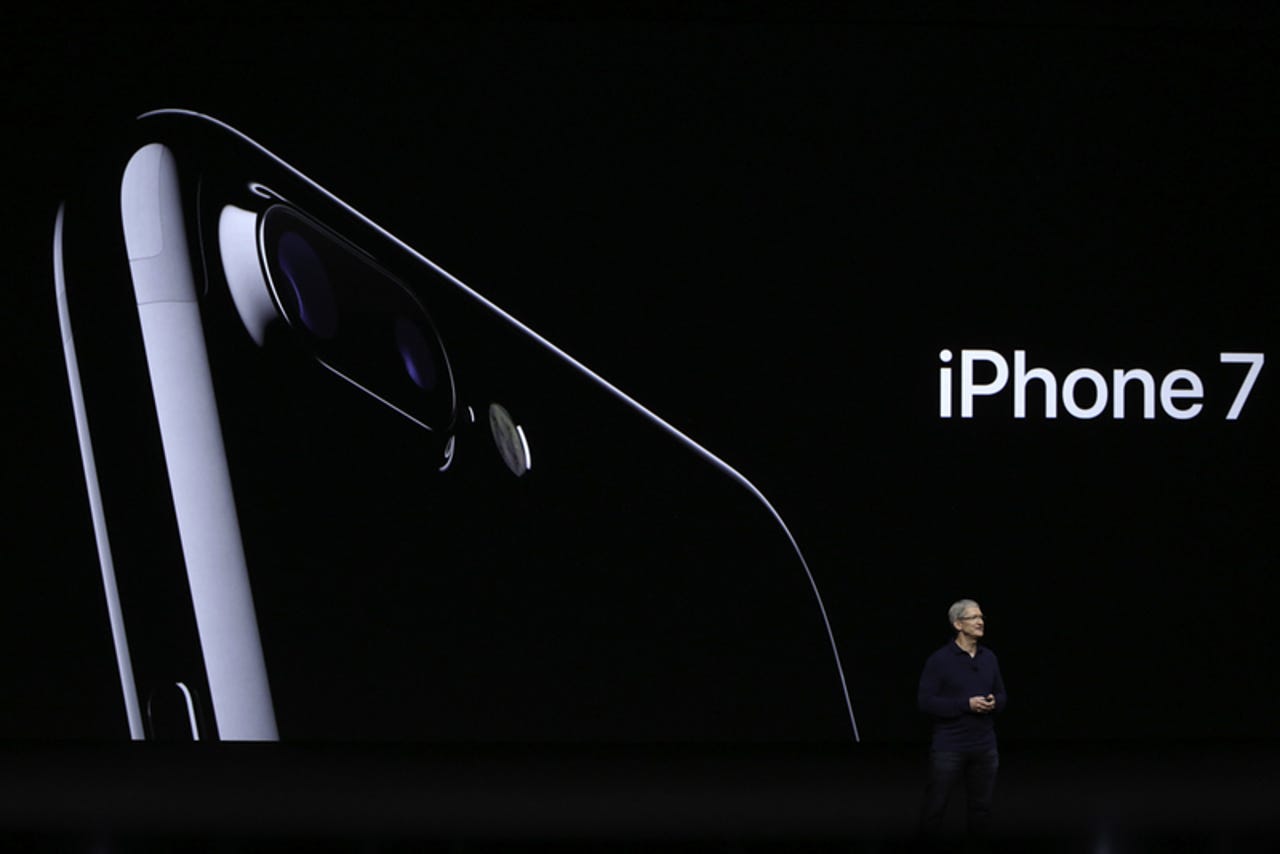Apple's iPhone 7: New camera, water-resistant, stereo speakers


Image: CNET/CBS Interactive
iPhon
Apple CEO Tim Cook launched the iPhone 7, a device that revamps the home button, improves the camera, and adds a series of interesting yet potentially incremental updates. The iPhone 7's primary task from a business perspective is to keep the sales engines running for Apple ahead of a 10th-anniversary launch one year from now.
There were few surprises at Apple's iPhone 7 launch. There's a revamped camera system and water resistance, and the home button received Force Touch technology. And, oh yeah, Apple says its iPhone 7 is waterproof -- much like Samsung's Galaxy S7 series. "It's the best iPhone we have ever created," said Cook.
The iPhone 7 Plus with a 5.5-inch screen has two 12-megapixel cameras.
"There's a reason why you see so many iPhones everywhere you look," said Cook. "We've now sold over a billion of them. The iPhone has transformed the way we do things every day."
Overall, Apple touted the polish, efficiency, materials, and finish of the iPhone 7. Apple pitched the iPhone 7 as the most evolved of its iPhones. "This is the best iPhone we've ever made," said Phil Schiller, Apple's marketing chief.
CNET: iPhone 7 first take: iPhone 7 Plus first take
Apple's iPhone 7 updates are powered by a new 64-bit processor, A10 Fusion, which is 40-percent faster than the A9. The A10 Fusion has two cores and run at one-fifth of the power. The iPhone 7 will shift between high performance and longer battery life in chip. Adobe Lightroom can be used on the A10 Fusion and replicates most of the features found on the desktop app.
The company says the iPhone 7 battery lasts two hours more than the iPhone 6S on average. Preorders for iPhone 7 start Sept. 9, with Sept. 16 availability. Pricing starts at $649 for iPhone 7, with 32GB/128GB/256GB storage options. Here's the lineup with installment plans.
This iPhone news shouldn't surprise anyone -- given that Apple mis-tweeted the iPhone 7 early just as Apple was outlining a new Nintendo Mario game for the App Store.
Among the interesting items:
- Apple revamped the home button with a new Taptic Engine.
- New water- and dust-resistance feature may help iPhone get into more rugged enterprise uses.
- A six-element lens and revamped camera system: "Everything about it is entirely new," said Schiller.
- The iPhone 7 Plus has a dual-camera system that can take an optical zoom from 1x to 10x. The larger zoom is software-based. "We are not saying to throw out your DSLRs... What we are saying is this is the best camera we've ever made in a smartphone," said Schiller.
- Apple moved to ditch the headphone jack and will connect headphones over Lightning. There are 900 million Lightning-enabled devices. Schiller said the plan was always to use Lightning for power, control, and audio. There will also be an adapter that'll be included in the box with iPhone 7 with no extra charge. "Some have asked why we would remove the analog headphone jack from the iPhone. It has been with us a very long time," said Schiller. "The reason to move on comes down to one word: courage."
- Apple AirPods, which improve wireless connectivity for better audio quality and five hours of listening, switch between devices -- and iCloud sets them up with one step.
- A new chip, called W1, which is Apple's first wireless chip, will power the AirPods.
- A new version of NFC will enable Apple Pay in Japan.
If you zoom out a bit, you run into a conundrum. Should you wait to upgrade? The iPhone 7 is about what it seems like: a bridge device to what many analysts expect to be a super cycle that'll kick off next year. Apple saw a pop from the iPhone 6 and larger screens, but tech buyers are hanging on to those devices a bit longer than the company would like.
Apple's iPhone sky isn't falling, but it seems plausible that the company is holding its innovation fire until next year. Cowen and Company analyst Tim Arcuri is in the camp of analysts who argue that the iPhone 7 is incremental but critical to set up a larger upgrade cycle. In a research note, he said:
Our view remains that iPhone 7 is just a "bridge" to get to a "super-cycle" for iPhone launch a year from now. Apple continues to save many of the big innovations for iPhone 10 (maybe called iPhone X) in calendar 2017.
What's the basis for the super-cycle upgrade argument? Arcuri argues that the iPhone base of devices older than two years ago will grow from 210 million units to 275 million units. "This creates a veritable powder keg for upgrades with an innovative new phone in '17," said Arcuri.
These economics may trump anything Apple can come up with for new features.
In a multiyear context, the iPhone 7 improvements make sense, but they're unlikely to return Apple to revenue growth. BCG analyst Colin Gillis said buying an iPhone will be like buying a microwave. It's something people do, but it's not a major event. Gillis has a point, but it's the same thing with PCs, tablets, and other tech devices. We're in the microwave phase of product cycles.